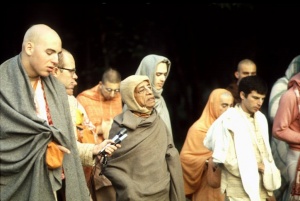SB 5.26.13: Difference between revisions
m (1 revision(s)) |
(Vanibot #0054 edit - transform synonyms into clickable links, which search similar occurrences) |
||
| (One intermediate revision by one other user not shown) | |||
| Line 1: | Line 1: | ||
{{info | {{info | ||
|speaker= | |speaker=Śukadeva Gosvāmī | ||
|listener=King | |listener=King Parīkṣit | ||
}} | }} | ||
[[Category:Srimad-Bhagavatam - Canto 05 Chapter 26]] | |||
[[Category:Bhagavatam Verses Spoken by Sukadeva Gosvami - Vanisource|052613]] | |||
<div style="float:left">'''[[Srimad-Bhagavatam]] - [[SB 5|Fifth Canto]] - [[SB 5.26: A Description of the Hellish Planets|Chapter 26: A Description of the Hellish Planets]]'''</div> | |||
<div style="float:right">[[File:Go-previous.png|link=SB 5.26.12]] '''[[SB 5.26.12]] - [[SB 5.26.14]]''' [[File:Go-next.png|link=SB 5.26.14]]</div> | |||
{{RandomImage}} | |||
==== TEXT 13 ==== | ==== TEXT 13 ==== | ||
<div | <div class="verse"> | ||
yas tv iha vā ugraḥ paśūn pakṣiṇo vā prāṇata uparandhayati tam apakaruṇaṁ puruṣādair api vigarhitam amutra yamānucarāḥ kumbhīpāke tapta-taile uparandhayanti | :yas tv iha vā ugraḥ paśūn pakṣiṇo vā prāṇata | ||
:uparandhayati tam apakaruṇaṁ puruṣādair api vigarhitam amutra | |||
:yamānucarāḥ kumbhīpāke tapta-taile uparandhayanti | |||
</div> | </div> | ||
| Line 13: | Line 21: | ||
==== SYNONYMS ==== | ==== SYNONYMS ==== | ||
<div | <div class="synonyms"> | ||
''[//vanipedia.org/wiki/Special:VaniSearch?s=yaḥ&tab=syno_o&ds=1 yaḥ]'' — a person who; ''[//vanipedia.org/wiki/Special:VaniSearch?s=tu&tab=syno_o&ds=1 tu]'' — but; ''[//vanipedia.org/wiki/Special:VaniSearch?s=iha&tab=syno_o&ds=1 iha]'' — in this life; ''[//vanipedia.org/wiki/Special:VaniSearch?s=vā&tab=syno_o&ds=1 vā]'' — or; ''[//vanipedia.org/wiki/Special:VaniSearch?s=ugraḥ&tab=syno_o&ds=1 ugraḥ]'' — very cruel; ''[//vanipedia.org/wiki/Special:VaniSearch?s=paśūn&tab=syno_o&ds=1 paśūn]'' — animals; ''[//vanipedia.org/wiki/Special:VaniSearch?s=pakṣiṇaḥ&tab=syno_o&ds=1 pakṣiṇaḥ]'' — birds; ''[//vanipedia.org/wiki/Special:VaniSearch?s=vā&tab=syno_o&ds=1 vā]'' — or; ''[//vanipedia.org/wiki/Special:VaniSearch?s=prāṇataḥ&tab=syno_o&ds=1 prāṇataḥ]'' — in a live condition; ''[//vanipedia.org/wiki/Special:VaniSearch?s=uparandhayati&tab=syno_o&ds=1 uparandhayati]'' — cooks; ''[//vanipedia.org/wiki/Special:VaniSearch?s=tam&tab=syno_o&ds=1 tam]'' — him; ''[//vanipedia.org/wiki/Special:VaniSearch?s=apakaruṇam&tab=syno_o&ds=1 apakaruṇam]'' — very cruel-hearted; ''[//vanipedia.org/wiki/Special:VaniSearch?s=puruṣa&tab=syno_o&ds=1 puruṣa]-[//vanipedia.org/wiki/Special:VaniSearch?s=ādaiḥ&tab=syno_o&ds=1 ādaiḥ]'' — by those who eat human flesh; ''[//vanipedia.org/wiki/Special:VaniSearch?s=api&tab=syno_o&ds=1 api]'' — even; ''[//vanipedia.org/wiki/Special:VaniSearch?s=vigarhitam&tab=syno_o&ds=1 vigarhitam]'' — condemned; ''[//vanipedia.org/wiki/Special:VaniSearch?s=amutra&tab=syno_o&ds=1 amutra]'' — in the next life; ''[//vanipedia.org/wiki/Special:VaniSearch?s=yama&tab=syno_o&ds=1 yama]-[//vanipedia.org/wiki/Special:VaniSearch?s=anucarāḥ&tab=syno_o&ds=1 anucarāḥ]'' — the servants of Yamarāja; ''[//vanipedia.org/wiki/Special:VaniSearch?s=kumbhīpāke&tab=syno_o&ds=1 kumbhīpāke]'' — in the hell known as Kumbhīpāka; ''[//vanipedia.org/wiki/Special:VaniSearch?s=tapta&tab=syno_o&ds=1 tapta]-[//vanipedia.org/wiki/Special:VaniSearch?s=taile&tab=syno_o&ds=1 taile]'' — in boiling oil; ''[//vanipedia.org/wiki/Special:VaniSearch?s=uparandhayanti&tab=syno_o&ds=1 uparandhayanti]'' — cook. | |||
</div> | </div> | ||
| Line 20: | Line 28: | ||
==== TRANSLATION ==== | ==== TRANSLATION ==== | ||
<div | <div class="translation"> | ||
For the maintenance of their bodies and the satisfaction of their tongues, cruel persons cook poor animals and birds alive. Such persons are condemned even by man-eaters. In their next lives they are carried by the Yamadūtas to the hell known as Kumbhīpāka, where they are cooked in boiling oil. | For the maintenance of their bodies and the satisfaction of their tongues, cruel persons cook poor animals and birds alive. Such persons are condemned even by man-eaters. In their next lives they are carried by the Yamadūtas to the hell known as Kumbhīpāka, where they are cooked in boiling oil. | ||
</div> | </div> | ||
__NOTOC__ | |||
<div style="float:right; clear:both;">[[File:Go-previous.png|link=SB 5.26.12]] '''[[SB 5.26.12]] - [[SB 5.26.14]]''' [[File:Go-next.png|link=SB 5.26.14]]</div> | |||
__NOTOC__ | |||
__NOEDITSECTION__ | |||
Latest revision as of 22:16, 18 February 2024

A.C. Bhaktivedanta Swami Prabhupada
TEXT 13
- yas tv iha vā ugraḥ paśūn pakṣiṇo vā prāṇata
- uparandhayati tam apakaruṇaṁ puruṣādair api vigarhitam amutra
- yamānucarāḥ kumbhīpāke tapta-taile uparandhayanti
SYNONYMS
yaḥ — a person who; tu — but; iha — in this life; vā — or; ugraḥ — very cruel; paśūn — animals; pakṣiṇaḥ — birds; vā — or; prāṇataḥ — in a live condition; uparandhayati — cooks; tam — him; apakaruṇam — very cruel-hearted; puruṣa-ādaiḥ — by those who eat human flesh; api — even; vigarhitam — condemned; amutra — in the next life; yama-anucarāḥ — the servants of Yamarāja; kumbhīpāke — in the hell known as Kumbhīpāka; tapta-taile — in boiling oil; uparandhayanti — cook.
TRANSLATION
For the maintenance of their bodies and the satisfaction of their tongues, cruel persons cook poor animals and birds alive. Such persons are condemned even by man-eaters. In their next lives they are carried by the Yamadūtas to the hell known as Kumbhīpāka, where they are cooked in boiling oil.